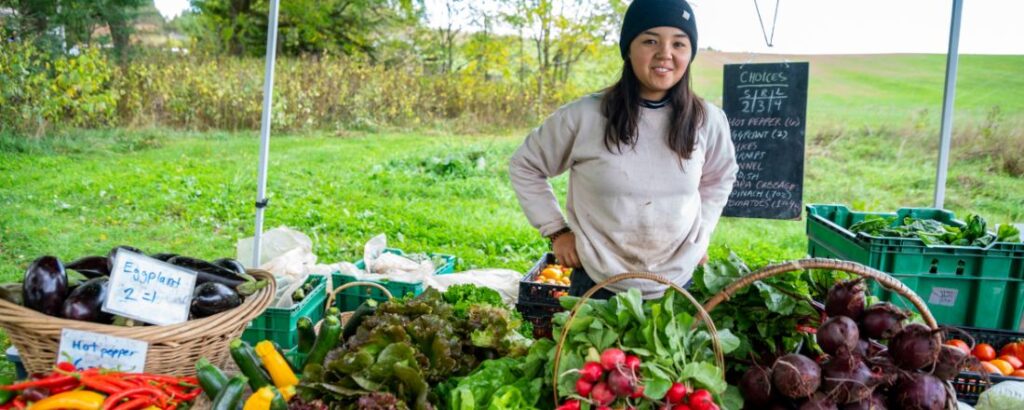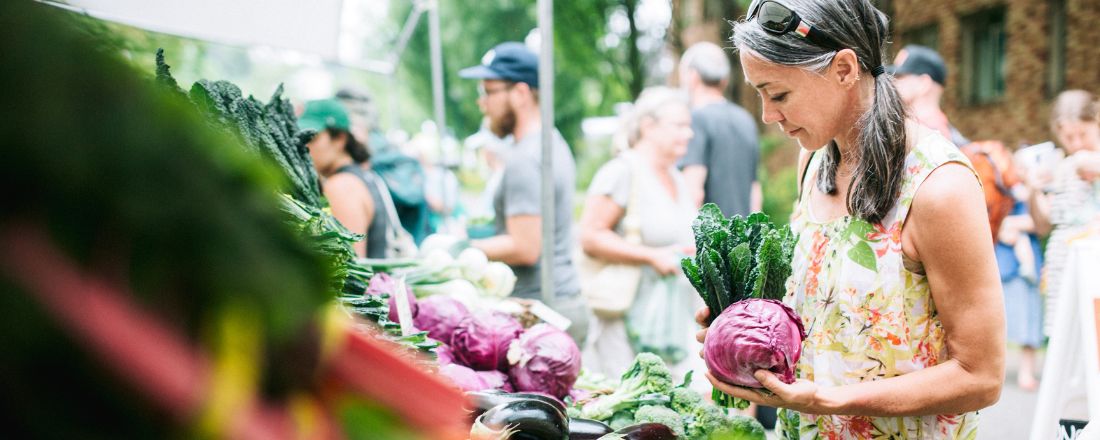The agricultural landscape in the United States has witnessed a remarkable transformation over the years. The proliferation of farmers markets has been astounding, surging from a mere 1,755 in 1994 to an impressive tally of over 8,200 in 2019. Even more astonishing is that approximately 75% of these new markets have emerged within the past decade, demonstrating a significant growth trend.
Similarly, the rise of Community Supported Agriculture (CSA) operations has been nothing short of explosive. Beginning with just two CSAs in the mid-1980s, their numbers multiplied exponentially, reaching nearly 3,400 in 2009. Remarkably, more than 12,600 farms have embraced the concept of CSAs, utilizing them as a means to market their agricultural products.
But what exactly is fueling this surge of interest in locally grown food, resulting in a market worth just over $1 billion? When surveyed, the majority of individuals attribute their enthusiasm to several key factors. Foremost among them is the availability of high-quality fresh fruits and vegetables, which are often synonymous with local produce. Additionally, the desire to support local farmers and businesses and the allure of a diverse range of options have emerged as compelling reasons for people to seek out their nearby markets or join CSAs. It is evident that consumer demand for these alternatives is steadily increasing, with individuals willing to go the extra mile to obtain superior produce.
In fact, a study conducted by Colorado State University, involving a broad spectrum of U.S. adults, revealed a notable shift in how folks buy fresh produce. The findings indicated a decline in the number of individuals procuring their fruits and vegetables from supermarkets or warehouse clubs, while the count of those opting for farmers markets and CSAs witnessed a consistent upward trajectory.
If you have yet to experience the vibrant atmosphere of a farmers market or are uncertain about what to expect, this comprehensive guide is designed to assist you. Not only will it offer valuable tips, suggestions, and resources to help you save money, but it will also enhance your shopping experience, and perhaps even facilitate the cultivation of new relationships along the way.

12 tips to get the most out of your trip to the farmers market
The farmers market is not merely a place to shop for food; it’s an experience to be savored. It can be a great place to spend some family time each week. Soak in the vibrant atmosphere, engage with passionate producers, and embrace the community spirit that permeates these local hubs of sustainable agriculture. By following these tips and fostering a deeper connection with your local food system, you’ll not only enjoy the benefits of high-quality, fresh produce but also contribute to a healthier, more sustainable food ecosystem.
Embrace a leisurely pace.
Visiting your local farmers market should be an unhurried and deliberate experience, allowing you to relish the Saturday morning ambiance, engage in conversations with friends and vendors, and revel in the joy of purchasing remarkably fresh food. Take the time to savor your time there.
Master the art of timing.
When you arrive at the farmers market can significantly impact your experience. If your priority is to secure the best selection from the widest array of offerings, make it a point to arrive early, when the market is brimming with an abundance of choices. Conversely, if you’re seeking the best deals and discounts, consider visiting towards the end of the market’s operating hours, as vendors may be more inclined to offer special prices to clear their remaining inventory.
Cultivate culinary curiosity.
Farmers’ markets are a treasure trove of unique and unfamiliar fruits and vegetables. Don’t shy away from trying something new and unfamiliar. Each market often features a vegetable or fruit that may be unfamiliar to you or that you haven’t yet explored in your culinary adventures. Embrace the excitement of bringing home something novel and different, expanding your gastronomic horizons.
Engage in fruitful conversations.
Seize the opportunity to engage with the farmers and other folks who produce the food. Inquire about their preferred methods of preparation and cooking. By asking them, you not only gain access to new recipes but also increase the likelihood of preparing the foods you buy in a manner that suits your taste buds. This interaction can also lead to valuable insights and foster a deeper connection with the producers.
Tote your own bags.
Instead of relying on the thin plastic bags often provided by vendors, consider bringing your own eco-friendly canvas or nylon bags. By doing so, you not only contribute to reducing waste but also ensure that your hands remain free for browsing and selecting fresh produce. For added convenience, consider bringing a cooler backpack to carry your purchases comfortably.
Cultivate vendor relationships.
Take the opportunity to establish meaningful connections with the vendors at the farmers’ market. As you frequent the market and build rapport, you may often find yourself enjoying exclusive deals and benefits. These relationships extend beyond transactional exchanges, offering you the chance to gain a new friend, because who doesn’t appreciate having more friends?
Explore bartering possibilities.
Many farmers at the market represent small-scale farms and, like any small business owners, are open to finding ways to save money. Consider offering a service or skill you specialize in as a bartering option. By leveraging your expertise, you may negotiate for complimentary meat or produce, creating a mutually beneficial arrangement.
Capitalize on bulk purchases.
The tried-and-true concept of buying in bulk applies at farmers’ markets too. Attempt this clever strategy: propose a set amount of money to the vendor and allow them to determine what they can provide within that budget. By giving the producer some flexibility in their offering, you may secure a better deal and have the advantage of choosing from the cream of the crop.
Engage in friendly negotiation.
While haggling can be part of the farmers market experience, it’s important to strike a balance and not become pushy. Most vendors genuinely want to provide you with a fair deal and build lasting relationships. Instead of solely focusing on price, prioritize the development of long-term connections. By nurturing these relationships, you are likely to save more money in the long run while fostering a sense of community and support.
Prioritize quality assurance.
Since most farmers markets take place outdoors, it’s essential to assess the quality of the produce before making a purchase, particularly if you are shopping during hot summer days or toward the market’s closing time. Carefully inspect each item, looking for signs of freshness, such as vibrant colors, firmness, and absence of bruises or blemishes. Don’t hesitate to engage with the vendors and ask about the produce’s quality or any concerns you may have. Ensuring the excellence of your purchases guarantees a satisfying culinary experience when you return home.
Embrace seasonal abundance.
One of the remarkable aspects of farmers’ markets is their alignment with the seasons. Embrace the ever-changing availability of fruits, vegetables, and other products that coincide with nature’s cycles. Make it a point to appreciate and celebrate the unique offerings of each season, indulging in the flavors and diversity that nature provides. By doing so, you’ll not only savor the freshest produce but also support sustainable agricultural practices.
Plan ahead and diversify.
Before heading to the farmers market, take a moment to assess your needs and plan your purchases accordingly. Consider creating a shopping list that includes a variety of ingredients to diversify your meals and maximize your culinary adventures. By planning ahead, you can make the most of your market visit and ensure that you bring home a well-rounded selection of farm-fresh goodness.
13 questions to ask a farmer
These questions serve as a starting point for initiating conversations with farmers at the market, allowing you to learn more about their farming practices, products, and expertise. By showing genuine interest and engaging in dialogue, you can establish a connection that may lead to a lasting relationship built on a shared passion for local, fresh food.
- What’s your name?
- Where’s your farm located?
- Do you give tours of your farm?
- When was this picked/harvested/processed?
- Can you recommend any recipes?
- What do you use for pest control?
- What do you use for fertilizer?
- Are you certified organic? (If they say no, ask them why. Becoming certified can be an expensive process and a lot of farmers follow organic procedures, but just haven’t paid to get the official certification.)
- Are the eggs/cows/pigs/chickens free-range/pastured? (Follow-up question – what’s your definition of “free-range/pastured”?)
- Can I try a sample?
- How should I store this?
- Do you grow any heirloom varieties?
- Can you recommend any lesser-known or underappreciated produce items that I should try?
Resources
USDA Community Supported Agriculture (CSA) Directory

